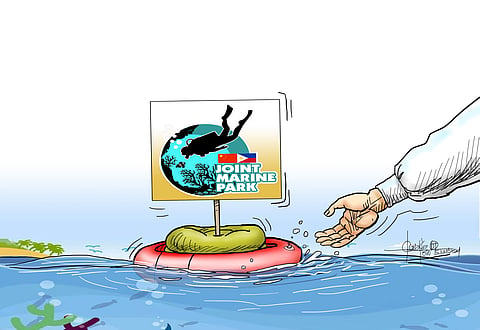
- NEWS
- the EDIT
- COMMENTARY
- BUSINESS
- LIFE
- SHOW
- ACTION
- GLOBAL GOALS
- SNAPS
- DYARYO TIRADA
- MORE

Science may offer a way to defuse the simmering conflict over the West Philippine Sea (WPS) based on a proposal made by the China unit of the Carnegie Endowment for International Peace.
According to the proposal, Beijing and Manila should consider jointly establishing a marine park at the Ayungin Shoal in the WPS to promote scientific research, environmental protection, and fishery cooperation.
According to scholars at the Carnegie Foundation, the idea has occasionally been discussed over the past decade, but it has yet to be addressed at the official level.
The report said if China and the Philippines consider this possibility, “it could positively impact regional peace and stability.”
The proposal makes good sense since, at the moment, the solution has been mainly based on the military aspect which only serves to inflame the situation.
Confronting the protagonists, however, is based on economic and diplomatic differences due to conflicting territorial boundary claims.
Carnegie scholars said due to “historical policy preference, regional strategic interests, and the usefulness of grey zone tactics, Beijing may want to avoid the blatant use of force against Manila to settle territorial and maritime disputes.”
It nonetheless warned that this does not mean Beijing will exclude using military force as a tool for resolving disputes. The risk of armed confrontation exists, particularly if more forceful actions are taken to render China’s grey zone approach ineffective.
Efforts to de-escalate the South China Sea conflict and restart the Beijing-Manila bilateral dialogue would be the surest way to prevent tensions and conflict from escalating into war.
Thus, it stated that setting up a marine park is a challenging yet intriguing policy proposal for decision-makers.
A proposal was indeed put forward regarding a marine conservation area in the hotly disputed region but it will be a sole undertaking of the Philippines.
Former National Security Adviser Hermogenes Esperon Jr. said the government considered declaring Pag-asa Island and Ayungin Shoal as marine protected areas (MPAs).
An MPA status would bar human activity in the preservation areas.
Nonetheless, Esperon said that the MPAs will later be offered as a joint undertaking with China and other nations.
The idea of an MPA was brought about by the frequency of poaching by Chinese vessels in the area despite the diplomatic and legal actions taken against the degradation of the resources in the regions of conflict.
A marine park would serve the same purpose of preserving marine resources but would be protected through an international convention. Participants, including the Philippines and Beijing, would have to abide by Philippine rules and international norms.
The bugbear in the proposal remains the recognition of China of the international rules that an exclusive economic zone encompassing the territories within the West Philippine Sea exists.
The 2016 Permanent Court of Arbitration award stated that the Philippines is entitled to the EEZ’s economic benefits, including the shoal and other features that China aggressively claims as within the nine-dash line that the arbitral tribunal invalidated.
Science, however, finds a way to the most difficult problem confronting humans. In the pandemic, science and solidarity defeated the microscopic monster that once threatened humanity’s known way of life. Scientific research is valuable mainly to the fishermen whose lives rely on the bounty that the sea provides.
Cooperation among nations must be meant to preserve the existence of individuals instead of involving them in a conflict that restricts their livelihood. Nobody wants war so what’s stopping nations from looking into ways to promote the common good?
